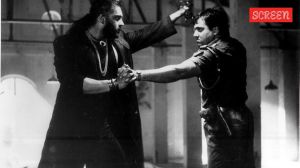On the table before foreign secy talks: Mysore detainee’s Pak passport from Karachi, A8179481
Barely two weeks to go for the crucial Foreign Secretary-level talks between India and Pakistan, the arrest of two Pakistani terrorists in Mysore has delivered rare corroborative evidence for New Delhi to point the finger at Islamabad: a Pakistan passport.

Barely two weeks to go for the crucial Foreign Secretary-level talks between India and Pakistan, the arrest of two Pakistani terrorists in Mysore has delivered rare corroborative evidence for New Delhi to point the finger at Islamabad: a Pakistan passport.
Muhammad Fahad, one of the two nabbed on Thursday, holds a Pakistan passport (A8179481) that was issued on November 10, 2004 at Karachi. He travelled to Bangalore on a 45-day visa via Mumbai in February this year. According to his passport, Fahad was born June 26, 1982 and is the son of Mohammed Abdullah’s wife. As has been said by the police, Fahad’s father had migrated to Pakistan from Kerala. He was also involved in earthquake relief activities.
This “irrefutable” evidence, sources said, will be taken up with Islamabad in the talks, which will also set up the anti-terror mechanism agreed by both sides at Havana.
Besides the passport details, the police have also got Fahad’s citizenship number (42101871794855), which is issued to every Pakistani citizen on their national identity card. This evidence, sources said, proves direct involvement of Pakistanis, a claim that Islamabad has always refuted.
Investigators in Mysore say the two were working to obtain Indian passports to allow themselves free movement between India and Pakistan and erase their Pakistani identity.
Fahad and Mohammed Ali Hussain, both 24, had been assigned the task of creating a base for their militant group Al Badr from a “safe’’ city like Mysore, while obtaining Indian identities for themselves and others sent to them, officers said. “They were here specifically for spade work, not direct attacks’’ a senior Karnataka police official said.
Fahad, a master’s degree holder in analytical chemistry, has his roots in the Kozhikode region in north Kerala. Today, a Kerala police raided the house of Mariyumma, Fahad’s stepmother in Kapad. While Mariyumma refused to speak about Fahad, a neighbour Mohammad Koya said, “He visited here nearly four months back but stayed at another relative’s house somewhere in the city.”
According to Mysore police chief Praveen Sood, “On arrival in India, through Mumbai, he deliberately did not register at the Foreigners Registration Office. He moved to Mysore, stayed at two different places during this period, and ran a ‘fancy’ store.”
According to the police, Fahad was carrying instructions to set up a hideout and logistics for an Al Badr attack team that would later come via Kashmir and Nepal. “His responsibility was to create Indian identities for those sent to him,” said police, adding, “Fahad was the main man, he was also tasked with managing the financial transactions of Al Badr. In Mysore, he received funds and transferred it to Al Badr cadre in Kashmir.”
In fact, the investigations leading up to the duo’s arrest lasted for nearly six months with the first leads coming from Srinagar. Hussain is said to have been a district commander for Al-Badr. A resident of Manshera in Pakistan, sources said, he crossed the Line of Control into Kashmir in 2002. He was involved in receiving funds and channelising them for operations in the Valley. Last year, however, he was tasked to move South to identify new targets and set up a cell to execute these attacks.
Fahad, who had been in touch with Al-Badr controllers in Pakistan, is believed to have brought funds from Pakistan and delivered it to Kashmir. Both Hussain and Fahad, sources said, then undertook this task to set up a base in the South.
Identification and travel documents aside, recoveries of CDs containing details of survey carried out of sensitive installations along with the Vikas Soudha building add to evidence. There are several phone numbers in Pakistan that have been found and the effort will now be to obtain Pakistan’s cooperation in this.
An ICICI bank account held by Fahad in Mysore, details of which were found in a laptop seized from him, is another key focus of the investigations to track down other Al Badr operatives.
There were, however, a few red faces in North Block after it emerged that the encounter claims of Karnataka police now stand challenged in the wake of statements by the landlady of the house where Fahad stayed. Yet, official sources insisted that mistakes of the local police must not detract from what was a fairly “well-developed” operation starting from the Valley, to Delhi and then Karnataka.




- 01
- 02
- 03
- 04
- 05



























